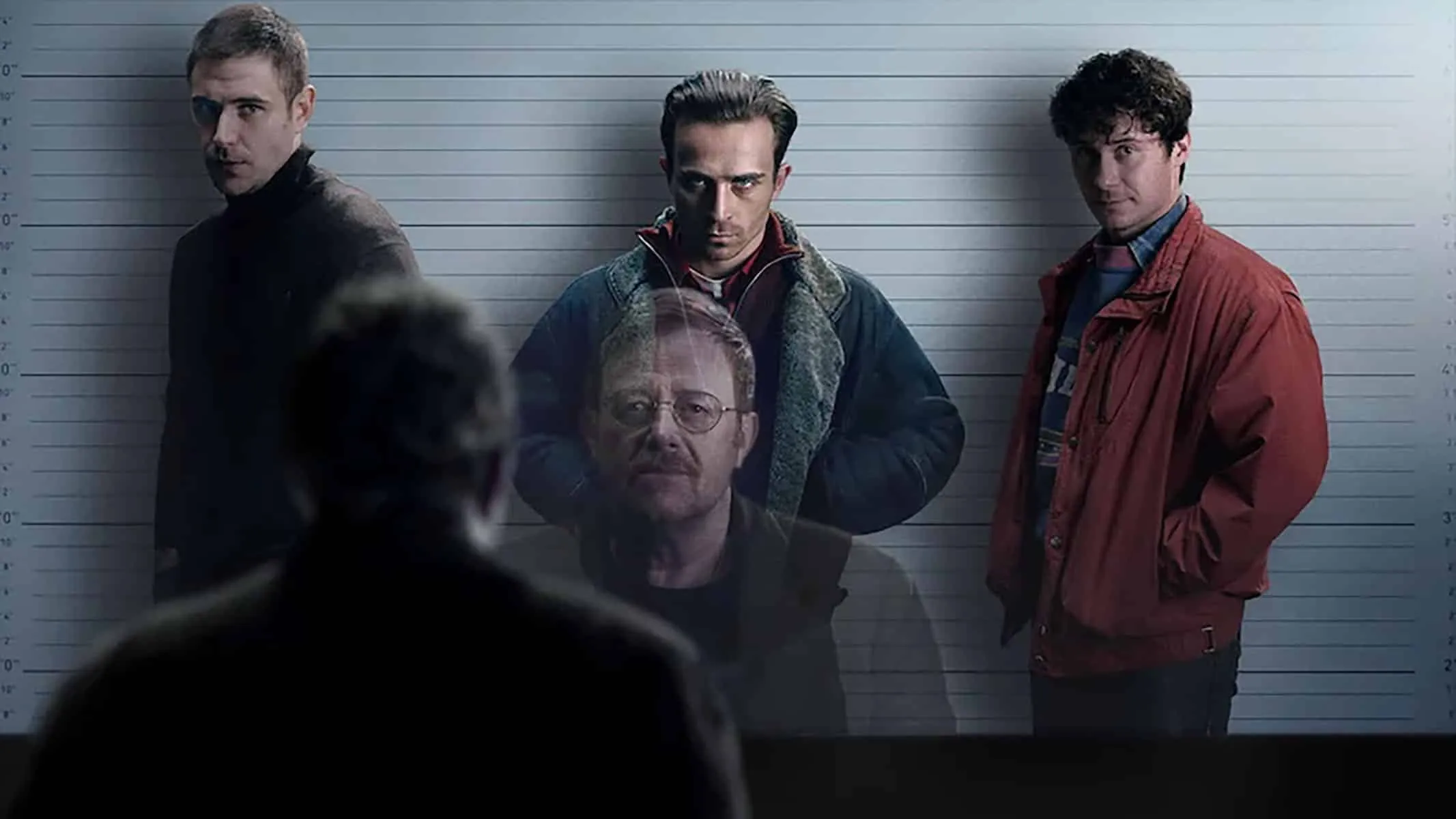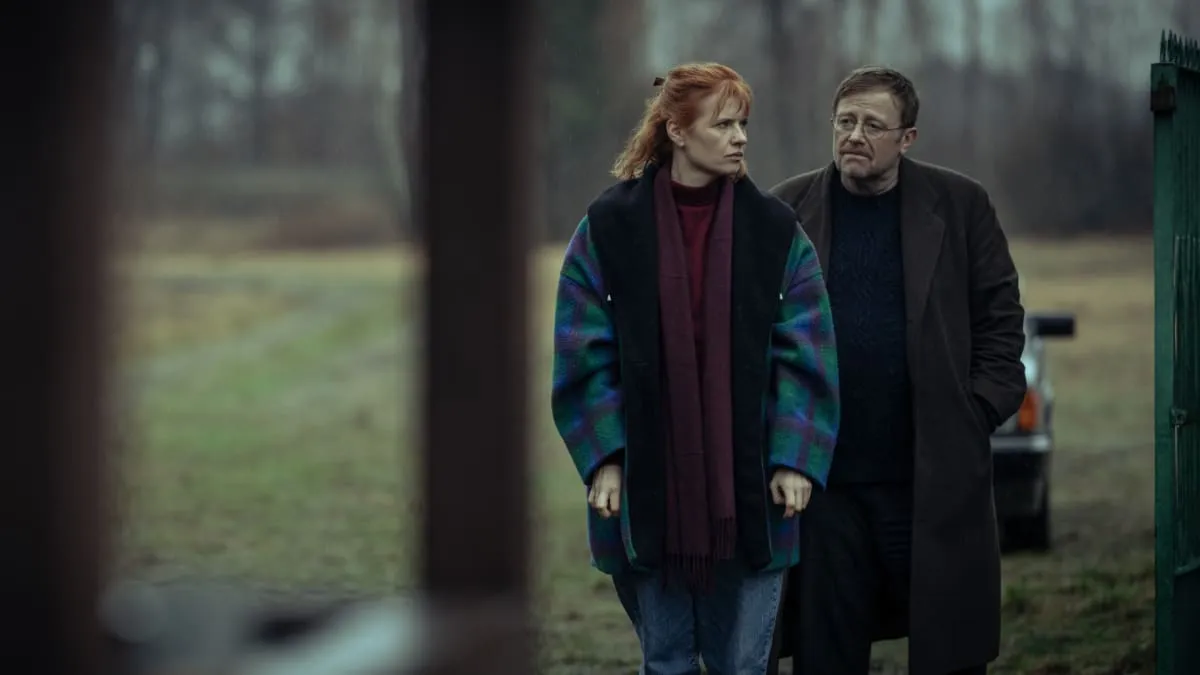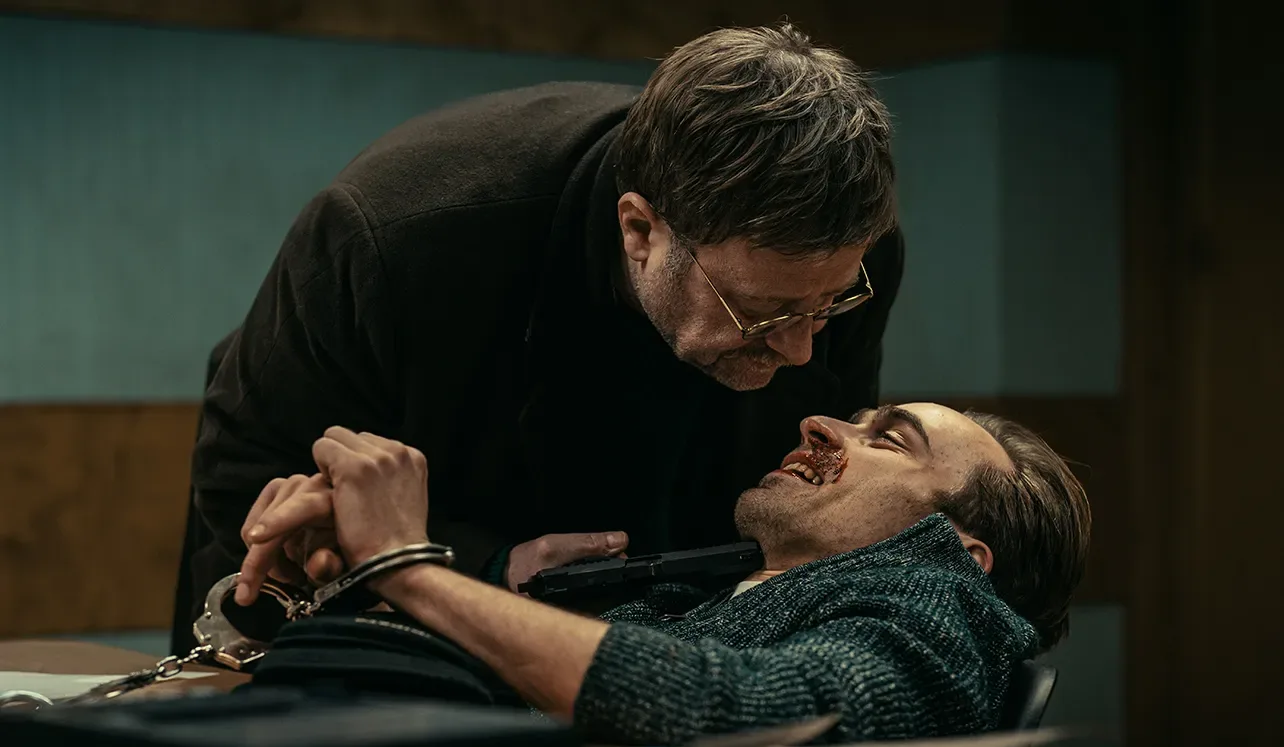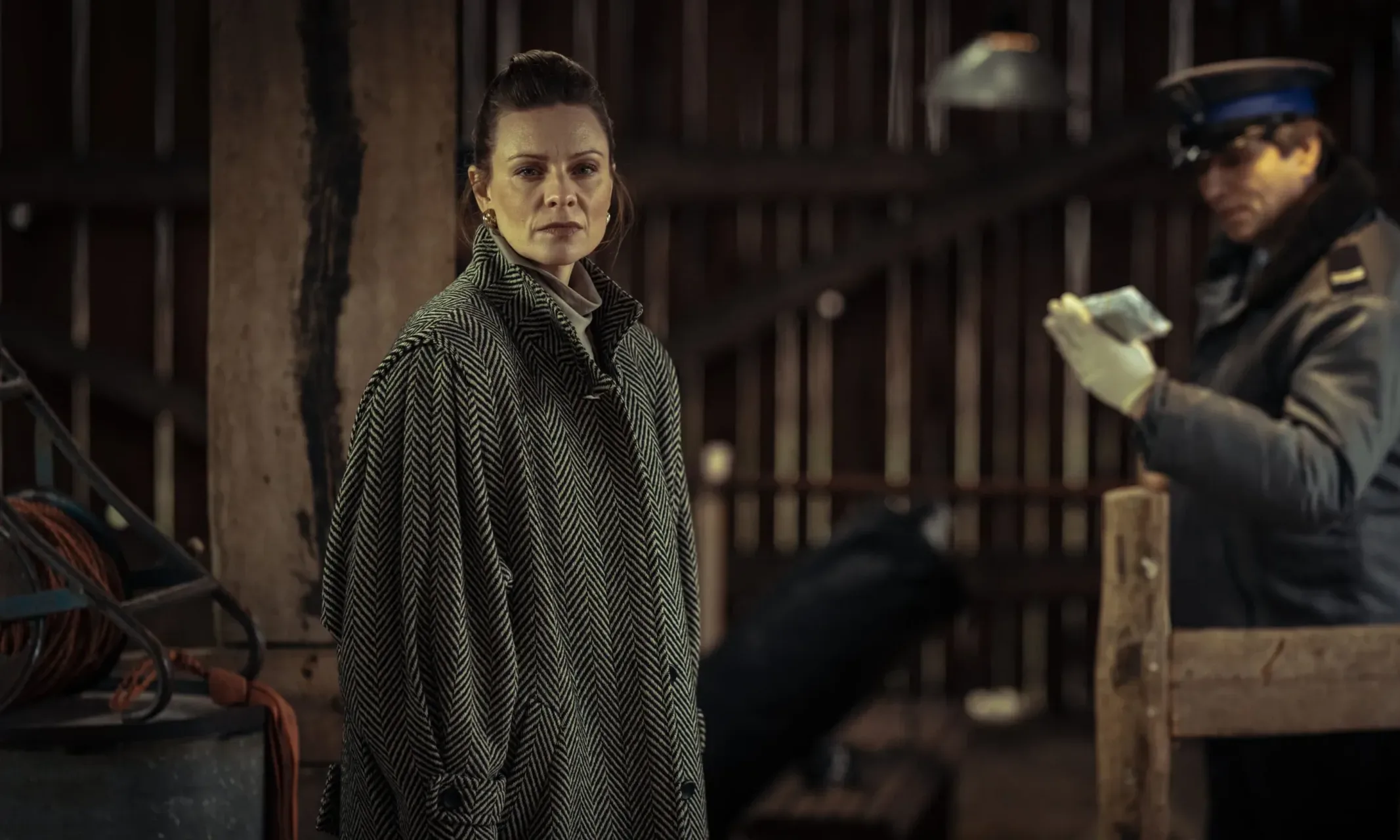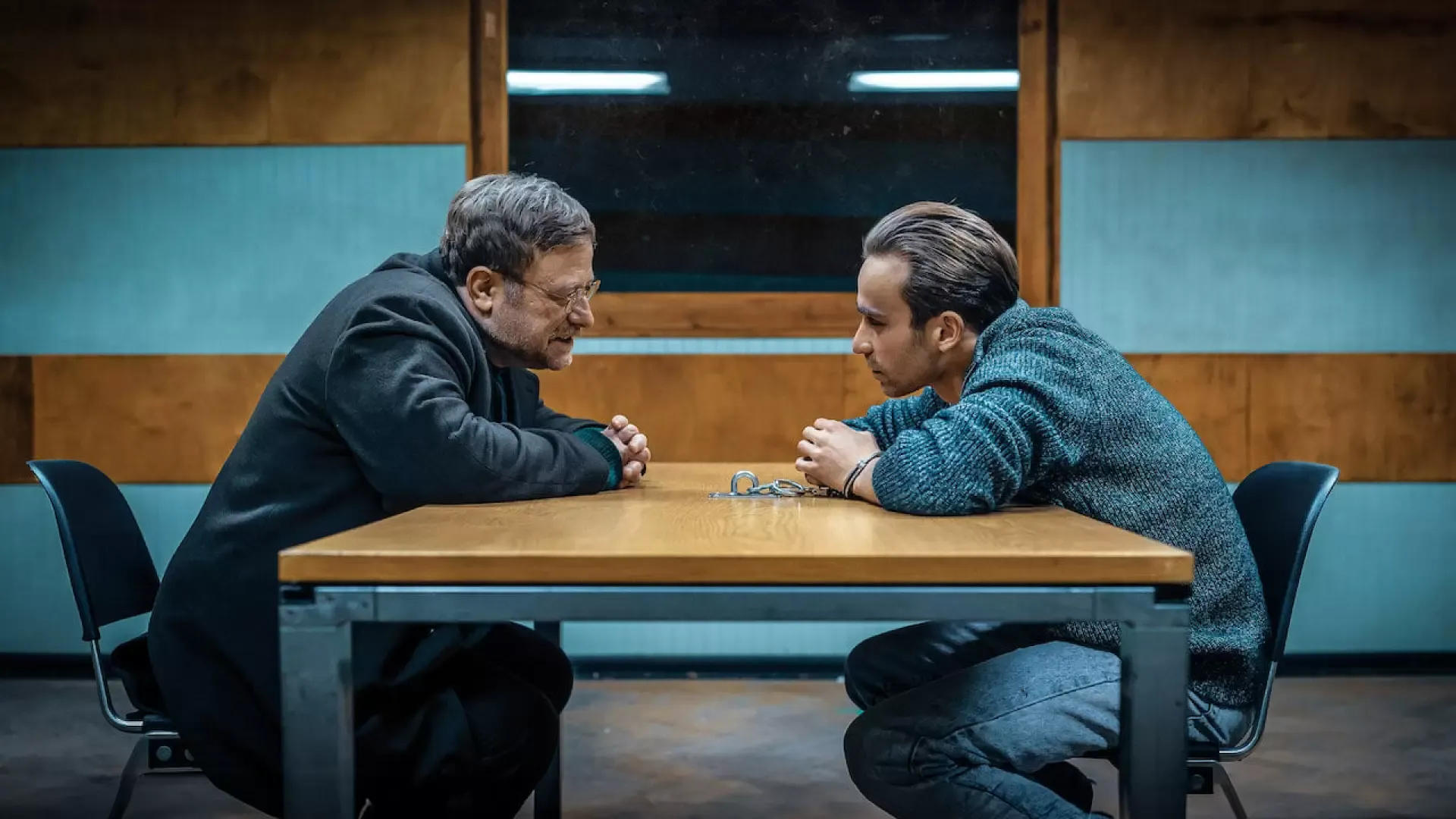In the harsh terrain of post-communist Poland, “Justice” emerges as a fascinating crime thriller that goes much beyond a mere whodunit. The film is set in the chaotic 1990s. It follows Tadeusz Gadacz, a disgraced investigator whose career hangs by a thread, much like his country’s budding democratic institutions.
Olaf Lubaszenko portrays Gadacz as a complex, grizzled detective who sells garden gnomes after being pushed out of law enforcement but retains the strong investigative instincts that previously made him fearsome. When a horrific bank heist kills three employees and a security officer, Gadacz is given a lifeline: solve the case in 15 days and maybe restore his professional image.
The investigation isn’t only about apprehending criminals. It’s a nuanced look at a society in transition as the remains of the communist regime collide with growing democratic organizations. Gadacz collaborates with young police officer Aleksandra Janicka, creating a relationship that represents the generational and ideological tensions of the time.
The bank robbery serves as a symbolic canvas, portraying a larger image of societal desperation, institutional corruption, and the personal consequences of seeking justice in a world where moral limits are constantly moving. With the bank’s privatization approaching and political pressures growing, Gadacz must negotiate a difficult situation in which his unusual ways could be his greatest advantage – or his final undoing.
Whispers of Corruption: The Investigative Maze
The bank robbery unfolds like a carefully designed puzzle, with violence that extends beyond thievery. Three bank employees and a security guard are killed, their bodies revealing a much more complex story than a simple crime. Enter Tadeusz Gadacz, a former detective who is now selling garden gnomes. He is drawn back into the investigation world by a mystery, well-dressed woman who offers him a tempting proposition: solve the case in 15 days and restore his professional dignity.
Gadacz’s investigation is far from conventional. He finds what others don’t: a fourth body buried in the ventilation system, minor signs pointing to numerous perpetrators, and linkages that his colleagues don’t notice. He begins to untangle the various layers of the crime with the help of Aleksandra Janicka, a young police officer who balances institutional expectations and the real search for truth.
The narrative moves with the rhythms of a society in transition. Each interrogation and crime scene examination is a microcosm of Poland’s complex post-communist landscape. Suspects like Kacper Surmiak, a security guard with a tangled personal history that includes an adopted sister, show the human cost of societal upheaval.
Gadacz’s approaches are unconventional but surgical. He plays with suspects using psychological insight and raw investigative ability. The study is about understanding the desperate impulses that push people to extreme actions in a world of economic uncertainty and institutional change, not merely solving a crime.
The clock ticks incessantly. With the bank’s privatization looming and political pressures growing, Gadacz must navigate a dangerous world where truth is as pliable as the evolving political system. His redemption story is intertwined with the larger narrative of a country changing itself, making “Justice” more than just a crime thriller; it’s a profound exploration of cultural change.
Shadows of Transformation: Characters Unmasked
Tadeusz Gadacz emerges as a protagonist straight out of the grimoire of world-weary detectives. Once a powerful investigator, now relegated to peddling garden gnomes, he bears the burden of a history entwined with the communist regime’s crooked machinery. His scruffy appearance and scant words speak loudly about a man who has seen too much but refuses to give up his fundamental sense of justice.
Lubaszenko represents Gadacz with great subtlety. He’s not your standard heroic cop but a morally complex character who works in shades of gray. We see his underlying honesty when he confronts a disrespectful customer in his gnome shop and returns stuff with justified rage. His investigative approach is surgical: he notices what others miss, asks questions that make bureaucrats uncomfortable, and pursues the truth with a dogged, subtle enthusiasm.
Aleksandra Janicka represents the next generation of Polish law enforcement. Young and divided between institutional demands and genuine ethical concerns, she reluctantly becomes Gadacz’s partner. Their relationship goes beyond the conventional mentor-protégé dynamic, representing the larger generational clash of a country redefining itself.
The suspects, Kacper Surmiak, Bartek Sawczuk, and Marek Nowak, are not simply narrative devices but complex characters fashioned by economic desperation and institutional dysfunction. Kacper’s tragic past as an adopted sister serves as a disturbing picture of the socioeconomic issues that post-communist Poland faces.
The narrative is enhanced by supporting characters. They’re not simply background noise, but vital threads in a complex tapestry of an inquiry that’s about far more than just solving a crime. Each character bears the scars of a transforming society, with their problems mirroring bigger institutional and cultural developments.
Gadacz’s coworkers saw him as a necessary maverick – “a son of a bitch, but our son of a bitch” – expressing subtle admiration for his unconventional but effective approach to justice.
Nuanced Performances: Breathing Life into Justice
With great understatement, Olaf Lubaszenko transforms Tadeusz Gadacz from a potential cliché into a truly intriguing character. His performance is a symphony of small gestures: a worn eye, a subtle shoulder tension, and a voice that carries decades of institutional memory. Lubaszenko does more than just act; he enters Gadacz, creating a character that says volumes in silence.
His most memorable scene is at the film’s conclusion when an understated monologue shows the profound interior landscape of a man seeking redemption. Each word feels like a well-set stone, contributing to a complex emotional superstructure that extends far beyond the traditional crime thriller protagonist.
Wiktoria Gorodecka, also known as Aleksandra Janicka, mirrors Lubaszenko’s intensity. She conveys the generational difference with amazing nuance—part skeptical rookie, part hopeful reformer. Their on-screen interaction is professional rather than romantic, with mutual respect and an underlying tension that mirrors Poland’s socioeconomic transition.
The supporting cast lifts the narrative through incredibly layered performances. Jedrzej Hycnar’s Kacper Surmiak grows beyond a basic suspect, instilling vulnerability in a potentially one-dimensional character. Lukasz Szczepanowski and Stanislaw Linowski bring layered complexity to their parts, ensuring each character feels truly human.
What emerges is an ensemble performance that elevates “Justice” from a straightforward procedural to a profound meditation on personal and communal restoration. Each performer becomes a narrative brushstroke, vividly portraying a country grappling with its history while urgently reaching for the future.
Framing Chaos: Visual Storytelling Unleashed
Michal Gazda’s directing transforms “Justice” from a conventional crime thriller into a sophisticated examination of societal upheaval. He takes a surgical approach, shunning sensationalism and favoring a finely crafted narrative that breathes raw honesty. Gazda does not manipulate moments to create tension; instead, he allows the human drama to unfold with astonishing calm.
The film’s visual environment reflects the psychological geography of post-communist Poland. Grainy, desaturated colors create a world on the verge of moral collapse. Shadows do more than just exist in the frame; they become characters in their own right, concealing secrets and hinting at hidden tensions simmering beneath the investigation’s surface.
Perhaps the most striking visual allusion is the police station’s unexpected centerpiece, a piranha tank. These razor-toothed fish form a silent Greek chorus, representing the predatory nature of institutional authority and individual survival. When a cop nonchalantly dumps flesh into the tank and watches the fish swarm, it’s a terrifying reflection of the investigation’s cruel ecosystem.
Gazda’s cinematographic choices are both intentional and heartbreaking. Crime scenes appear real rather than contrived. The camera moves like Gadacz himself: watchful, somewhat skewed, capturing subtleties that others might miss. Each frame is a meticulously crafted composition addressing greater themes of corruption, redemption, and the human capacity for cruelty and deep compassion.
The visual design does more than merely assist the narrative; it becomes an integral character in the storytelling, transforming “Justice” from a simple crime drama into a powerful reflection on societal transformation.
Words Unspoken: Crafting Cinematic Dialogue
The screenplay for “Justice” works like a precision instrument, dissecting the complex anatomy of post-communist Polish society with meticulously designed language and narrative architecture. Dana Lukasinska and Bartosz Staszczyszyn wrote a script that is more than just a crime investigation; it’s a significant sociological x-ray.
The narrative architecture wonderfully combines procedural elements and deeply intimate storytelling. Each interaction feels like a chess match, with characters revealing themselves more through what they don’t say than what they do. Gadacz’s austere communication style becomes its language, with a grunt here and a pointed statement conveying volumes about institutional mistrust and personal perseverance.
Dialogue carries historical significance. When characters speak, they are not just transferring information but navigating the complex landscape of a society emerging from communist rule. The screenplay highlights delicate power relations across generations, institutional systems, and personal ambition versus group survival.
The authors excel at capturing moments of surprising humanity. A talk about garden gnomes evolves into a philosophical reflection, while an investigation reveals layers of institutional desperation. Characters do more than communicate; they negotiate survival, redemption, and meaning.
Thematically, the screenplay balances hard-boiled research with insightful character exploration. It raises awkward questions: What does justice entail in a system that is continuously redefining itself? How do individuals use their moral compass to negotiate institutional corruption?
The screenplay transforms “Justice” from a straightforward crime thriller to a deep investigation of human complexity by rejecting standard heroic storylines.
Verdict: More Than Meets the Gavel
“Justice” is a cinematic experience beyond standard crime thrillers’ bounds. It’s more about dissecting the soul of a nation in change than solving a crime. Olaf Lubaszenko’s performance grounds the film, transforming what could have been a straightforward procedural into a profound reflection on personal and communal atonement.
The film’s greatest strength is its unvarnished honesty. It doesn’t romanticize research or heroism but offers a raw, nuanced examination of institutional intricacy. While some viewers may perceive the pacing as purposeful, others ready to engage will uncover a rich tapestry of human drive and social evolution.
Minor narrative errors and philosophical wandering do little to weaken the film’s primary strength. “Justice” is a major step forward in Polish cinema, refusing to reduce human complexity and inviting audiences to confront hard truths about morality, survival, and the continual negotiation of personal integrity in the face of institutional problems.
This film offers a captivating, thought-provoking trip through the moral terrain of a society changing itself for audiences seeking more than surface-level drama.
The Review
Justice
"Justice" is a superb examination of moral uncertainty set against the turbulent backdrop of post-communist Poland. Director Michal Gazda creates a crime thriller that is considerably more than its genre suggests: a deep character study that delves into institutional corruption, personal redemption, and social transformation. Olaf Lubaszenko's portrayal of Tadeusz Gadacz lends the film great depth, transforming what could have been a routine procedural into a deep meditation on justice and survival. The film's strength is its ability to turn a bank heist investigation into a larger narrative about a society grappling with its identity. While the pacing may challenge viewers looking for more traditional thriller dynamics, those willing to immerse themselves will find a deep, multifaceted cinematic experience long after the credits roll.
PROS
- Exceptional lead performance by Olaf Lubaszenko
- Nuanced exploration of post-communist Polish society
- Sophisticated narrative structure
- Compelling character development
- Authentic cinematographic approach
- Powerful thematic depth
- Strong ensemble cast
CONS
- Occasionally slow narrative pacing
- Complex themes might alienate casual viewers
- Some character arcs could be more fully developed
- Potentially challenging for audiences unfamiliar with Polish societal context
- Moments of narrative ambiguity









































